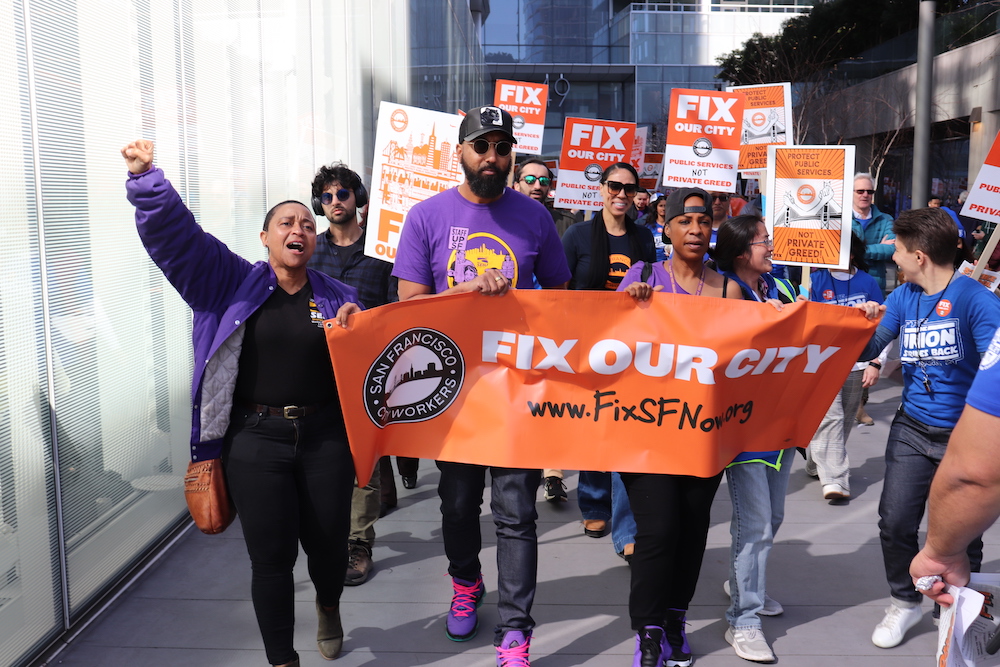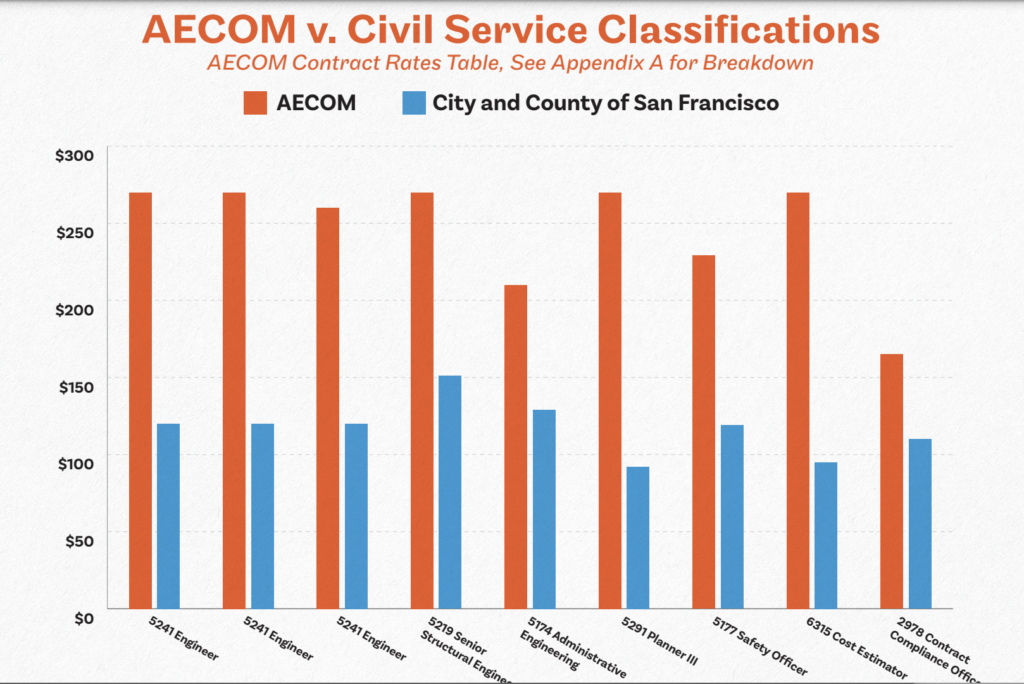San Francisco has 3,747 vacant jobs—and has spent more than $211 million in the past two years filling some of those positions with outside contractors who charge far more than what city workers would earn, a new study shows.
And the vast majority of that money goes to big out-of-town companies—that is, it leaves San Francisco and does nothing to help the local economy.

The study, by analysts with IFPTE Local 21, which represents thousands of city employees, shows that the percentage of the city budget spend on local workers has dropped from 51 percent ten years ago to 46 percent today.
In some departments, like the scandal-plagued Public Works, the drop has been even more dramatic: DPW used to spend 35 percent of its budget on staff, and now it’s 26 percent.
In the meantime, DPW and the Public Utilities Commission have contracts worth more than $150 million on contracts with companies like AECOM, a giant engineering outfit based in Dallas, which paid its CEO $9.5 million last year.
AECOM charges the city far more than it would cost to fill that job with public employees:

From the report:
A breakdown of billing rates in the AECOM Wastewater Capital Plan Delivery contract with SFPUC reveals that contractors were being paid up to $300 per hour with multipliers as high as 3.05. The multiplier in this contract is an additional cost to the contractor’s hourly rate and accounts for the company’s desired profits and any overhead expenses. Currently, the Department of Public Works (DPW) has 13 active contracts with AECOM for As-Needed Environmental Contracting Services totaling $2 million in contract awards.DPW reports over 400 vacancies with a vacancy rate of 22%. In general, the City currently reports 153 vacant engineering positions and 49 vacant planning positions, the equivalent of an 18% and 16% vacancy rate respectively.
The SFPUC contracts were issued by the former director, Harlan Kelly, who has been convicted of fraud and linked to the bribery scandal that enveloped City Hall under Mayor London Breed.
Muni has a contract with WSP Global worth $5 million, and:
A breakdown of billing rates in the $5 million WSP USA contract with SFMTA for As-Needed specialized consulting services reveals that contractors were being paid up to $301.02 per hour with multipliers as high as 3.14. Language in the contract allows WSP to charge the City a fixed fee of at most 7% of their estimated direct salaries and overhead costs for the sole purpose of making profit. In addition to this fixed fee, WSP is allowed to charge an additional fixed fee on subconsultant’s work of at most 3% of the subconsultant’s total labor charges.
The Department of Public Health has an ongoing, $85 million contract with Cross Country Staffing to provide nurses for positions that the city has failed to fill.
The contract nurses are more expensive, in part because the city is also underwriting corporate profits and high executive salaries:
In 2022, the company reported $2.8 billion in revenues—a dramatic increase of 235% since 2020. Profits in 2022 were over $188 million. The company’s CEO was paid over $3.2 million in 2022, more than double their compensation of $1.28 million in the previous year. In total, Cross Country’s six top paid executives were paid over $10 million in 2022. The median employee of the firm was paid only $45,550.2
Research by Local 21 shows that many departments ae in essence double-dipping: They are requesting funding for public-employee positions that remain vacant, and at the same time requesting funding for outside contractors to fill those positions. Just eliminating the outside contracting requests would have a multimillion impact on the general-fund deficit.
The Mayor’s Office is projecting Cost of Living increases not just for nonprofit contractors, whose workers are often underpaid, but for the corporate for-profit contractors. City documents show this will add $32 million to the deficit.
All of this is happening as Mayor Breed is looking at across-the-board cuts—and as the contracts for the major public-employee unions are all expiring June 30.
This time around, city employees have the right to strike—and if there’s no deal, that’s a real possibility. “We are gearing up to be strike-ready,” Jamie Lee, Local 21 Bargaining Team member and San Francisco resident, told 48hills. “We love our city and we know it needs to be fixed.”
The major local unions, which are working in solidarity, have scheduled a “strike school” for March 13.
A public employee strike in June would be a political disaster for the mayor. At this point, she has put forward no concrete proposal to address the union demands.
But her opponents are talking.
Sup. Ahsha Safai, who is trying to move a bit to the left and is putting himself forward as a pro-labor candidate, was at the rally at SF General when the nurses complained about contracting out. “We continue to contract out and pay more for the services,” he told me. “this mayor has allowed [the contract talks] to reach a crisis point.”
I am awaiting comment from Daniel Lurie. I was unable to reach the Mark Farrell campaign, such as it is at this point, for comment.
Sup. Connie Chan, who chairs the Budget Committee, voted Tuesday against allowing the Department of Homelessness and Supportive Housing to continuing using no-bid sole-source contracts:
HSH has a budget of over $600 million and has had a contract waiver in place since 2019 allowing them to circumvent the city’s standard oversight process without any real results. Homelessness is still a major issue in San Francisco, several current providers have come under scrutiny for mismanagement and subpar facilities and our residents are frustrated we are spending millions while making little progress. With our looming $1.3 billion budget deficit, we cannot afford to allow public spending on multi-million-dollar contracts to go unchecked.
Hearings on the budget start in earnest in March.





